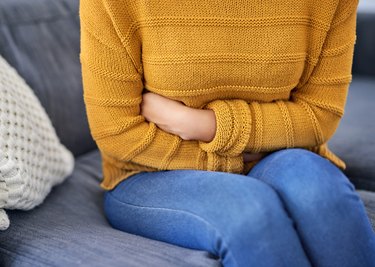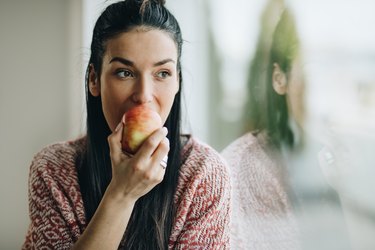
Pears are a powerful source of calcium, vitamin D, potassium and fiber, four nutrients many Americans don't get enough of, says Isabel Maples, RDN, national spokesperson for the Academy of Nutrition and Dietetics.
Like other fruits (and vegetables), pears generally benefit your digestive system, keeping blood glucose levels stable and preventing constipation by making sure foods and their byproducts pass easily through your body. But that's not always the case: Sometimes, the sugar alcohols in pears can lead to gas, bloating, abdominal pain and even diarrhea.
Video of the Day
Video of the Day
Learn whether pears are good for digestion and other benefits and side effects of eating them.
1. Pears Can Help Keep Your Regular
Pears are high in fiber, which plays an outsized role in digestion and gut health. One medium-sized pear has 5.5 grams of fiber, per the USDA. Most of this is insoluble fiber and the rest soluble, Maples says.
While your body can't digest either variety of fiber, both provide health and digestive benefits, including helping ease diarrhea and prevent constipation:
- Soluble fiber: This variety is digested in the large intestine (colon) and can produce gas. It feeds the "good" gut bacteria and lowers cholesterol among other benefits. "Fiber is very important to support beneficial microbes," says Kalidas Shetty, PhD, founding director of the Global Institute of Food Security & International Agriculture (GIFSIA) at North Dakota State University in Fargo. It can also slow down digestion time which may help if you have diarrhea.
- Insoluble fiber: This type of fiber moves right through your digestive tract providing the "bulk" that keeps you regular. "The idea is that keeping things moving along in the gut means less constipation and toxins don't have time to build up," Maples explains.
2. Pears Can Cause Gas
Gas starts with the sugar alcohols or polyols fermenting in the large intestine, says Carol Ireton-Jones, RDN, PhD, owner of Good Nutrition for Good Living in Dallas. "You may feel this more in someone with IBS [irritable bowel syndome] than someone without IBS," she says.
Polyols are poorly absorbed by your body, Ireton-Jones says. "A little might be okay but if you eat too much, it's going to go from the small intestine to the large intestine, where it's not supposed to be and where it can cause things like diarrhea, gas, bloating and abdominal pain," Ireton-Jones says.
One type of sugar alcohol or polyol is sorbitol, which you'll find in diet products, candy and chewing gum and also in medications, per Kaiser Permanente. Consuming it can lead to gas, bloating, cramping, abdominal pain and diarrhea, says Elena Ivanina, DO, director of neuro-integrative gastroenterology at Lenox Hill Hospital in New York City.
3. Pears Can Cause Bloating
Gas often — but not always — leads to bloating. (As many as 90 percent of people with IBS can experience bloating, per the Cleveland Clinic.)
It's not enough to blame polyols for both gas and bloating. Pears are also high in sucrose, a two-part sugar (disaccharide) which is broken down by enzymes into a one-part or simple sugar (monosaccharide) called fructose.
Sucrose and fructose provide fuel for cell energy but your body can only absorb about 25 grams of fructose, or about six teaspoons, a day, Maples says. If there's too much of this simple sugar, it bypasses cells and lands in the large intestine, providing a feast for bacteria and leading to more gas, Ireton-Jones says.
4. Pears Can Lead to Abdominal Pain
Gas can then lead to abdominal pain, which is often mistaken for other things. Per Johns Hopkins Medicine, when gas builds up on the left side of the colon, it can be misdiagnosed as heart disease. On the right side of the colon, it could be mistaken for gallstones or appendicitis.
People often get rid of gas and its associated bloating and pain by burping (belching) and flatulence.
5. Pears Can Act as a Natural Laxative
Pears are often touted as a natural laxative to help you poop, although they may not on their own be enough to relieve constipation. "I would never tell anybody to have a ton of any specific thing," says Ireton-Jones. "I just say 'Add some fruit.'"
Acting as a natural laxative is a good thing if you're blocked up. But it can also cause problems. The fructose and sorbitol in pears have been linked to diarrhea in children, according to the article in Nutrition Today. And eating a lot of fructose — more than 40 to 80 grams per day — can lead to diarrhea in adults, per Harvard Health Publishing.
Plus, pears are considered a high-FODMAP food (or one that's high in fermentable oligosaccharides, disaccharides, monosaccharides and polyols) — eating those kinds of foods may lead to gas, pain and diarrhea in people with IBS, according to Harvard Health Publishing.
6. Pears Can Help Stabilize Blood Sugar
Although not a process that takes place directly in your digestive system, pears are also one of the foods that can balance out blood sugar levels, helpful in keeping your entire system healthy. "Fruits and vegetables in general slow the digestive process allowing insulin to better manage blood sugars," Shetty says. "You won't get an overburst of excess sugar with pears."
The Digestive Effect of Different Types of Pears
The nutritional benefits of fruit in general derive mostly from eating whole foods rather than canned, frozen or dried. With pears, the digestive effects seem less influenced by the type of preparation — whether pears are ripe, unripe or overripe, or eaten raw, cooked or juiced — than by the pear variety. (That said, pear juice can be good for constipation.)
"The most important factors to consider are type of pear and portion size," Dr. Ivanina says. "For example, a prickly pear has more acceptable amounts of fructose and sorbitol. One entire pear has a lot of fructose and sorbitol but having a teaspoon of pear would likely not cause any symptoms."
When to Avoid Eating Pears
Certain groups of people are more likely to develop the gas, bloating and stomach pain after eating fruit. Consider avoiding pears if you:
- Have fructose malabsorption: This is when your cells can't absorb this particular sugar, a condition which may affect as many as 40 percent of the Western population, according to the National Library of Medicine. In addition to fruits, many vegetables, wheat products and sodas as well as sweeteners like honey and agave nectar contain fructose.
- Are on a low FODMAP diet (whether or not you have IBS): All of these compounds are highly fermentable sugars that produce a lot of gas if the small intestine has trouble absorbing them, Maples says. The FODMAP diet is designed to eliminate all foods containing any of these sugars then slowly add each one back in to identify which may be causing the irritation. "You eliminate certain carbohydrates for six or eight weeks then systematically bring them back," Maples explains.
- Have inflammatory Bowel Disease (IBD) like Crohn's disease or colitis: Pears and other foods with non-absorbable sugars like sorbitol can trigger flares in people who have IBD, a condition characterized by inflammation of the digestive tract.
- Are experiencing a diverticulitis flare: "We don't recommend fresh fruits if a person with diverticulitis is having a flare, waiting to have surgery or has just had surgery," Ireton-Jones says. Canned pears and sauces are probably safe during this time, she adds. And fresh fruit can be added as the person recovers.
Bottom line: Experts recommend we eat five servings of fruits and vegetables a day to reap health benefits of a lower risk of stroke, heart attack and diabetes. Most pears are about one-and-a-half servings, says Ireton-Jones.
"Some people may have challenges with certain fruits," Ireton-Jones says. "But, overall, all fruits are great."
- Nutrition Today: “Systematic Review of Pears and Health”
- Cleveland Clinic: “What’s the Difference Between Soluble and Insoluble Fiber?”
- Mayo Clinic: “Dietary fiber: Essential for a healthy diet”
- Johns Hopkins Medicine: “Gas in the Digestive Tract”
- Cleveland Clinic: “Bloated Stomach”
- National Institute of Diabetes and Digestive and Kidney Diseases: “Symptoms & Causes of Gas in the Digestive Tract”
- Food & Function: “Fruits and their impact on the gut microbiota, gut motility and constipation”
- Pediatric Gastroenteology, Hepatology & Nutrition: “Diets for Constipation”
- Harvard Medical School: “How many fruits and vegetables do we really need?”
- National Library of Medicine: “Hereditary fructose intolerance”
- Cleveland Clinic: “What Is Fructose Intolerance?”
- Johns Hopkins Medicine: “FODMAP Diet; What You Need to Know”
- Crohn’s & Colitis Foundation: “What Should I Eat?”
- Crohn’s & Colitis Foundation: “What is IBD?”
- USDA: "Pears"
- Harvard Health Publishing: "Is something in your diet causing diarrhea?"
- Harvard Health Publishing: "Try a FODMAPs diet to manage irritable bowel syndrome"
- Kaiser Permanente: "Fructose or Sorbitol Intolerance"
- U.S. Food and Drug Administration: Guidance for Industry: A Food Labeling Guide (12. Appendix F: Calculate the Percent Daily Value for the Appropriate Nutrients)
Is this an emergency? If you are experiencing serious medical symptoms, please see the National Library of Medicine’s list of signs you need emergency medical attention or call 911.


